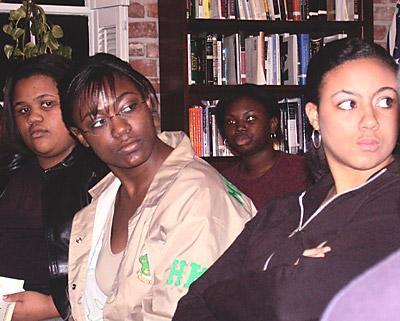Chalkers, hip-hop classes and minority recruitment were on students’ minds at the African American Cultural Center during a town hall meeting Tuesday night.
The Black Student Union and the LSU chapter of the NAACP hosted the informal meeting to allow students to voice their concerns about major campus minority issues. Students addressed a group of panelists, as well as their peers.
“We want to share in open dialogue with students about the issues that co ncern them,” said Daphne LaSalle, an internal auditing senior and BSU president.
The panelists, Student Government President Darrell Broussard, SG Vice President Mark Higgins, Assistant Director of the Office of Multicultural Affairs Katrice Albert and Reveille contributing writer Neil Dowdell offered their insight on the issues at hand.
Broussard opened the discussion by asking the audience what they thought of Chancellor Emmert’s visit to the center regarding the Master Plan’s moving of the AACC and Women’s Center.
“We don’t have plans to tear down unless we have plans to rebuild,” Broussard said.
Albert assured the audience construction on the AACC or Women’s Center never would affect the programming sponsored by the two entities.
“Chancellor Emmert is a friend to the AACC,” Albert said. “He is very committed to multicultural affairs and would not threaten the center unless he had plans to rebuild it.”
A student asked if those promises would be upheld if the chancellor were to move to another university.
“We, of course, can not be assured he will stay here,” Albert said. “We can only hope his replacement would be just as supportive and friendly.”
Broussard reminded the crowd the Master Plan is not a one-man operation.
“No matter who goes and who stays, the Board of Supervisors, faculty and dedicated students won’t allow for the neglect of the AACC and the Women’s Center.”
The students also were concerned about minority student recruitment, as Daphne LaSalle asked if it was necessary on LSU’s campus.
“It is definitely necessary,” Dowdell said. “Many African Americans don’t look at LSU because of the lower black population. I really think a little more energy could be put toward minority recruitment.”
Mark Higgins offered some insight concerning SG’s plans for recruitment.
“We are planning, along with Southern University, to invite high-school students to campus to have roundtable discussions that will try to dispel some of the myths concerning LSU,” Higgins said. “Current students will be able to help orient prospective students.”
Melody Robinson, president of the NAACP, offered her advice on recruitment.
“The bottom line is that we have to make as many people feel as welcome as possible,” Robinson said.
After hearing a few more students’ thoughts, the discussion moved to the infamous Quad chalker and racial tension on campus.
“The chalker is responding to our programming. He or she sees that in 10 short years we have started many programs for ethnic minority students, which makes them feel threatened,” Albert said.
Brandon Smith, a political science sophomore, said he thinks there is a racial problem on campus.
“The problem is that we have a lot of culturally insensitive people on this campus,” Smith said.
The audience of around 40 continued the dialogue with questions and comments on other campus minority issues, such as favoritism toward athletes and how to improve communication among campus minorities.
“Dialogue like this is absolutely essential,” Broussard concluded. “We need to bring other campus faculty and administrators that can make some changes to the table in the near future.”
The town hall meeting wrapped up two hours after it began, with many students still discussing a combination of the night’s issues.
Discussion alleviates students’ fears
November 14, 2002

Discussion alleviates students’ fears



